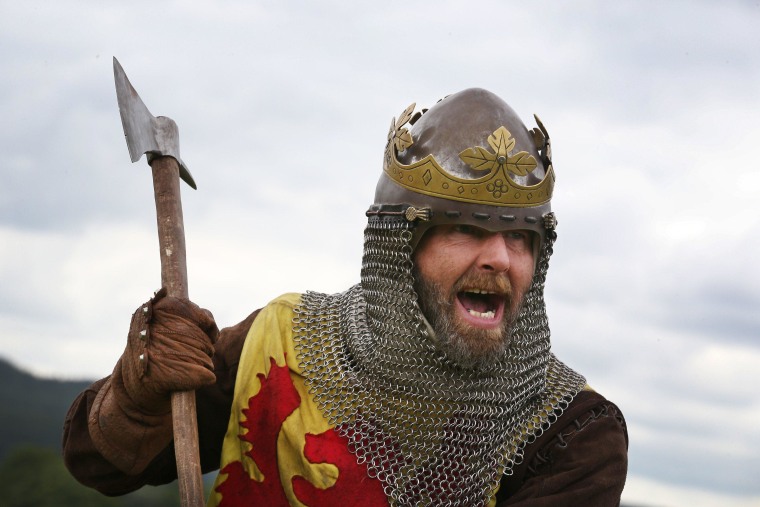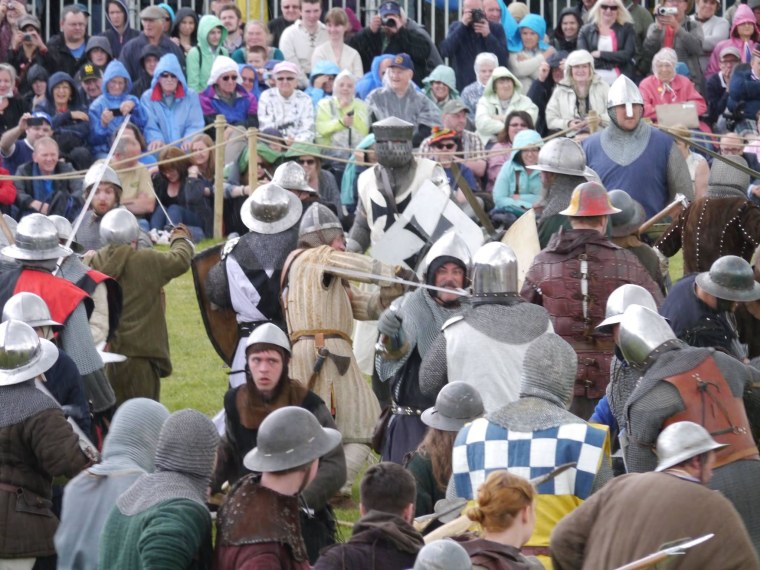BANNOCKBURN, Scotland - Exactly 700 years after Scottish warriors scored a celebrated victory over an invading English army, Scots are engaged in a new battle for independence – this time, at the ballot box.
The unlikely triumph of Robert the Bruce at the Battle of Bannockburn in 1314 helped to secure Scotland’s status as an independent country until the early 18th century, when the Act of Union created the United Kingdom.
Sign up for breaking news alerts from NBC News
A dramatic commemorative re-enactment of that medieval battle over the weekend came with special significance amid the slings and arrows of a ferocious political campaign. Scotland is 80 days away from a referendum on whether it should separate from the rest of Britain and regain independence for the first time since 1707.
The modern battlefield is social media, where the economic and social pros and cons of a future divorce from London rule are debated under the #indyref hashtag. But in a country whose evocative history has shaped the national character, the past remains important.
"Dressing up as an awesome warrior ... I mean, what is there not to like?”
“Bannockburn is such an important part of the Scottish psyche,” said Scott McMaster, the National Trust for Scotland’s expert on the Wars of Independence and manager of the official Bannockburn visitor center. “It is not only one of the most significant battles fought in Scottish history, it is also the story of the underdog.”
That helps explain the framing of the independence debate in Scotland, whose 5.3 million inhabitants represent about eight percent of the total U.K. population and would create a new country bigger than Ireland (4.5 million) but smaller than Denmark (5.5 million).
After a long campaign for home rule, Scotland got its own parliament in Edinburgh in 1999 but control of defense, borders and taxation remains with the U.K. parliament in London’s Westminster, and ultimate authority lies with the monarch, Queen Elizabeth II.
The “Yes Scotland” pro-independence campaign believes Scotland should have total control of its own affairs. The nationalist government in Edinburgh, led by First Minister Alex Salmond, says Scotland could keep the pound sterling currency and the monarchy but break free from London control.
The “Better Together” campaign, which seeks a "No" vote in the Sept. 18 referendum, says independence would be an “irresponsible gamble” financially and that Scots would have to raise taxes to pay for the loss of services currently shared with England, such as the National Health Service and government pensions. It is backed by the Conservative and Liberal Democrat parties that form Britain’s current coalition government, and Labour – the opposition party in both the British and Scottish parliaments.
In 1314, Scotland’s Robert the Bruce overcame significant military disadvantage – England’s Edward II had at least twice as many men – to secure victory after an exhausting 48-hour fight in the shadow of Stirling Castle, a key fortress protecting Highland Scotland from the lowlands of the south. It was an important win - coming nine years after the English captured and executed William Wallace, played by Mel Gibson in the 1995 movie, “Braveheart” – and is celebrated in the chorus of Scotland’s unofficial national anthem, Flower of Scotland, in which England’s “proud Edward” is sent homeward “to think again”.

Estimates vary about the size of the competing armies – and even about the exact location of the battle.
On Saturday and Sunday, more than 200 volunteers from 10 countries staged a condensed re-enactment of the Battle of Bannockburn - complete with cavalry, pikes and chain mail – on the field where it was most likely first fought.
“A lot of people have a passion about something and a lot of people have a passion about history,” said Malin Heen-Allan of re-enactment producers, Clan Ranald. “Dressing up as an awesome warrior ... I mean, what is there not to like?”
"I would say vote with your intellect, not your heart"
Among the crowd watching was Jane Sweeney, 65, from Dunedin, Florida, which has twin city status with Stirling, the area where Bannockburn lies. "I think it means a lot when you are a descendant," she said. "I have a mother who is Scottish – so when you come over you carry that in your heart and sometimes – a lot of the time – you just keep feeling it, it brings you to where your roots are from generation to generation. I just feel like the land and the people – especially the beautiful people – are in my heart."
Dianne Wheatley-Giliotti, 71, also from Dunedin, said: "It’s very exciting to be here. I’m a history major and I like to step back and get a sense of continuity to the present. When I think of Scotland I think of the Scots that came to the United States and settled. We are very curious about how the people are going to go in September relative to being an independent nation or being connected to the British Commonwealth."
Asked if she had any advice from an independent nation, America, to Scotland, she said: “I would say vote with your intellect, not your heart.”

The event’s intersection of history and politics unsurprisingly attracted controversy, and was overshadowed by the decision to host the annual U.K. Armed Forces Day parade only a few miles away.
Some claimed the decision to hold an independence referendum weeks after Bannockburn anniversary would unfairly benefit the “Yes” campaign; then there were complaints that the timing of the armed forces parade unfairly helped the “No” side with the presence of British Prime Minister David Cameron, who took the opportunity on Saturday to speak about Scotland’s role in British success and the importance of U.K. defenses in providing both national security and employment.
But for Bannockburn event organizers, the focus remained on history, not politics. “For the most part, politicians have steered clear of trying to gain from event,” said McMaster. “There are lots of other events in Scotland this year, too – the Commonwealth Games next month and the Ryder Cup in September. Bannockburn came in the era of feudal war. The referendum is about our economy, our society.”